必修一-Unit4-Earthquakes词汇复习说课讲解
- 格式:ppt
- 大小:1.13 MB
- 文档页数:73
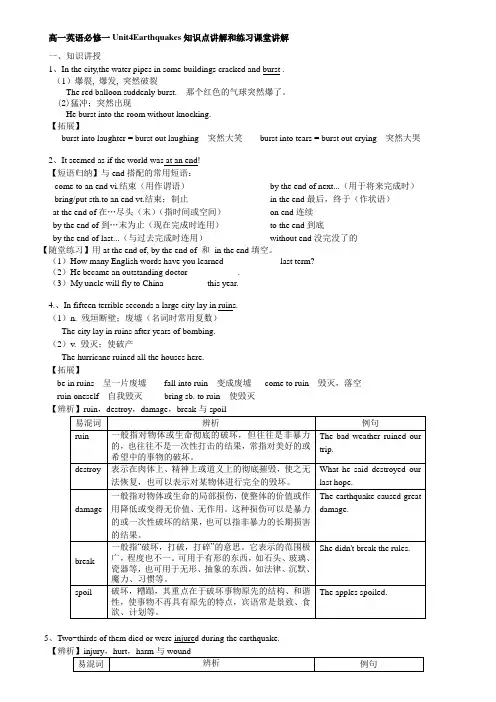
高一英语必修一Unit4Earthquakes 知识点讲解和练习课堂讲解一、知识讲授1、In the city,the water pipes in some buildings cracked and burst .(1)爆裂, 爆发, 突然破裂The red balloon suddenly burst. 那个红色的气球突然爆了。
(2)猛冲;突然出现He burst into the room without knocking.【拓展】burst into laughter = burst out laughing 突然大笑 burst into tears = burst out crying 突然大哭2、It seemed as if the world was at an end!【短语归纳】与end 搭配的常用短语:come to an end vi.结束(用作谓语) bring/put sth.to an end vt.结束;制止 at the end of 在…尽头(末)(指时间或空间) by the end of 到…末为止(现在完成时连用) by the end of last...(与过去完成时连用) by the end of next...(用于将来完成时)in the end 最后,终于(作状语)on end 连续to the end 到底without end 没完没了的【随堂练习】用at the end of, by the end of 和 in the end 填空。
(1)How many English words have you learned ____________ last term?(2)He became an outstanding doctor ___________.(3)My uncle will fly to China _________ this year.4.、In fifteen terrible seconds a large city lay in ruins.(1)n. 残垣断壁;废墟(名词时常用复数)The city lay in ruins after years of bombing.(2)v. 毁灭;使破产The hurricane ruined all the houses here.【拓展】be in ruins 呈一片废墟 fall into ruin 变成废墟 come to ruin 毁灭,落空ruin oneself 自我毁灭 bring sb. to ruin 使毁灭5、Two -thirds of them died or were injured during the earthquake.【辨析】injury ,hurt ,harm 与wound6、Some of the rescue workers and doctors were trapped under the ruins.(1) n.援救,营救The police came to his rescue and pulled him out of the river.(2)v. 救援;拯救He rescued a boy from drowning.【拓展】rescue sb./ sth. from sb./ sp. 把···从···营救出来come to/ go to sb’s rescue = rescue sb. 援救某人 a rescue team 救援队a rescue mission 救援任务rescue workers 救援人员【随堂练习】用rescue的适当形式填空(1)The mother, along with her two children, _________from the sinking boat by a passing ship.(2)The firemen ________ five children from the burning house yesterday.7、…that hot water give out .(1)分发;发出Students were giving out leaflets to everyone in the street.The red radiator gives out a lot of heat.(2)用尽My money will give out soon.【归纳总结】give out分发;发出;用尽give sth.away赠送;颁发;泄露give back归还;恢复give in呈上;投降,屈服,认输give off发出,放出give over停止,中止give up放弃give on to/onto sth.朝向,面向;通向8、Your speech was heard by a group of five jueges,all of whom agreed that it was the best one this year.(1) n.裁判员;法官;审判员His father used to be a judge. 他的父亲过去是一名法官。
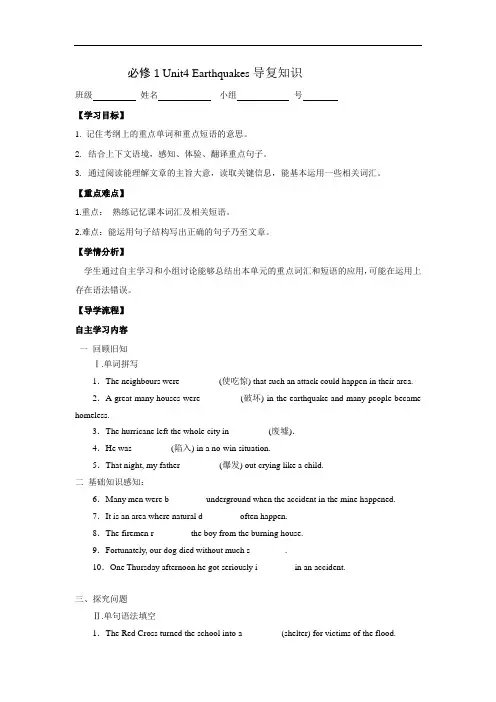
必修1Unit4 Earthquakes导复知识班级姓名小组号【学习目标】1.记住考纲上的重点单词和重点短语的意思。
2. 结合上下文语境,感知、体验、翻译重点句子。
3. 通过阅读能理解文章的主旨大意,读取关键信息,能基本运用一些相关词汇。
【重点难点】1.重点:熟练记忆课本词汇及相关短语。
2.难点:能运用句子结构写出正确的句子乃至文章。
【学情分析】学生通过自主学习和小组讨论能够总结出本单元的重点词汇和短语的应用,可能在运用上存在语法错误。
【导学流程】自主学习内容一回顾旧知Ⅰ.单词拼写1.The neighbours were ________ (使吃惊) that such an attack could happen in their area.2.A great many houses were ________ (破坏) in the earthquake and many people became homeless.3.The hurricane left the whole city in ________ (废墟).4.He was ________ (陷入) in a no-win situation.5.That night, my father ________ (爆发) out crying like a child.二基础知识感知:6.Many men were b________ underground when the accident in the mine happened.7.It is an area where natural d________ often happen.8.The firemen r________ the boy from the burning house.9.Fortunately, our dog died without much s________.10.One Thursday afternoon he got seriously i________ in an accident.三、探究问题Ⅱ.单句语法填空1.The Red Cross turned the school into a ________ (shelter) for victims of the flood.2.These doctors are working under ________ (extremely) pressure at the moment.3.She was shaking with fright as ________ she had seen a ghost.4.I was ________ (shock) that he had resigned.5.Many of the ________ (injure) are still in a serious condition.四、基础知识拓展与迁移:Ⅱ.选词填空right away,at an end,in ruins,dig out,1.My holiday is ________ and I must go back to work tomorrow.2.Many buildings in that country were ________ because of the recent earthquake.3.As the farmer ploughed the field, he ________ a pot of jewelry.4.________ houses were brought down by the hurricane.5.At the sight of the snow, he went out to play with his child ________.请及时记录自主学习过程中的疑难:小组讨论问题预设:Ⅲ.单句改错1.The child talked to us as if he was an adult.________________________________________________________2.He found his son trapping inside the lift, feeling very worried.________________________________________________________3.The injured men have been dug of the snow.________________________________________________________4.Burying in doing research on wild plants, he seldom returned home.________________________________________________________5.The number of people who were killed have reached more than 40,000 so far.________________________________________________________提问展示问题预设:Ⅳ.短文改错Having a dream is of great importance. Your dreams are ordinary and realistic. I hope I will admitted into a top university and become a good doctor after I will graduate from university. I hoped one day I can find a cure for cancer. I hope those whom love me and those whom I love will be healthy and live happy every day. To realize my dreams, I will take more exercises to build up my body. I will try my best to focus time and energy to my study. I must work hard at my lessons or be fully preparing for the entrance exam.答案:Having a dream is of great importance. Your①Mydreams are ordinary and realistic. I hope I will∧②be admitted into a top university and become a good doctor after I will\③graduate fromuniversity. I hoped④hope one day I can find a cure for cancer. I hope those whom⑤wholove me and thosewhom I love will be healthy and live happy⑥happilyevery day. To realize my dreams, I will take moreexercises ⑦exercise to build up my body. I will try my best to focus time and energy to⑧onmy study. Imust work hard at my lessons or⑨and be fully preparing⑩preparedfor the entrance exam.课堂训练问题预设:见金版教程整理内化:1、课堂小结2、本节课学习内容中的问题和疑难。
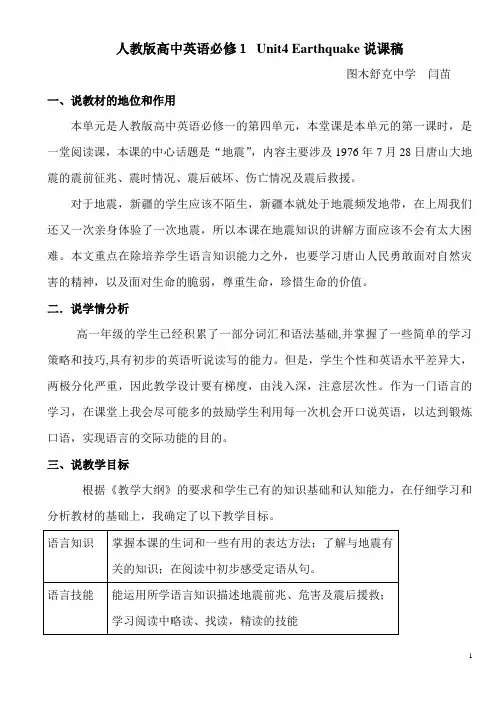
人教版高中英语必修1Unit4 Earthquake说课稿图木舒克中学闫苗一、说教材的地位和作用本单元是人教版高中英语必修一的第四单元,本堂课是本单元的第一课时,是一堂阅读课,本课的中心话题是“地震”,内容主要涉及1976年7月28日唐山大地震的震前征兆、震时情况、震后破坏、伤亡情况及震后救援。
对于地震,新疆的学生应该不陌生,新疆本就处于地震频发地带,在上周我们还又一次亲身体验了一次地震,所以本课在地震知识的讲解方面应该不会有太大困难。
本文重点在除培养学生语言知识能力之外,也要学习唐山人民勇敢面对自然灾害的精神,以及面对生命的脆弱,尊重生命,珍惜生命的价值。
二.说学情分析高一年级的学生已经积累了一部分词汇和语法基础,并掌握了一些简单的学习策略和技巧,具有初步的英语听说读写的能力。
但是,学生个性和英语水平差异大,两极分化严重,因此教学设计要有梯度,由浅入深,注意层次性。
作为一门语言的学习,在课堂上我会尽可能多的鼓励学生利用每一次机会开口说英语,以达到锻炼口语,实现语言的交际功能的目的。
三、说教学目标根据《教学大纲》的要求和学生已有的知识基础和认知能力,在仔细学习和分析教材的基础上,我确定了以下教学目标。
语言知识掌握本课的生词和一些有用的表达方法;了解与地震有关的知识;在阅读中初步感受定语从句。
语言技能能运用所学语言知识描述地震前兆、危害及震后援救;学习阅读中略读、找读,精读的技能情感态度学习唐山人民勇敢面对自然灾害的精神;以及面对生命的脆弱,尊重生命,珍惜生命的价值。
文化意识了解各种自然灾害的名称和地震的情况, 详细了解地震的常识,提高学生的震时自我保护意识。
学习策略培养学生通过各种途径如报纸、杂志、书籍和网络等资源搜集信息的能力。
四.说教学重点和难点1.重点:依据《英语课程标准》话题项目表关于自然灾害部分的话题要求(P76),了解、理解该自然灾害的情况,以达到能够交流、阅读、书面表达该类文章的能力。

必修一Unit 4 Earthquake Section A&B&C11.burst➢v.(使)爆裂;(使)膨胀;爆发;burst-burst-burstThe water pipe cracked and burst.➢n.突发,爆发✶There was a burst of laughter in the next room.隔壁房间里突然爆发出一阵笑声。
➢v.猛冲;突然出现✶He burst into the room without knocking.他没敲门就闯进了房间。
【拓展】●burst into+名词=burst out doing 突然...起来✶burst into tears=burst out crying 突然哭起来/ burst into laughter=burst out laughing突然笑起来●burst in闯进●be bursting with充满;爆满✶The roads are bursting with cars.车辆把那些道路挤满了。
● a burst of (突然)一阵lion百万【用法】one million一百万several million几百万a dozen million一千两百万millions of+名词几百万...【其他数字用法】tens of thousands of...数以万计的...hundreds of thousands of...几十万【其他表示数字的词】dozen一打(十二) score(二十)13.event n.(1)事件;(尤指)大事●current/the latest events当前事件/最新事件(2)(体育比赛等的)项目,赛事●one of the major sporting events of the year年度重大体育赛事之一【辨析】event 重要事件;比赛项目The Asian Games were one of the major sporting eventsof the year.亚运会是年度重大体育赛事之一。
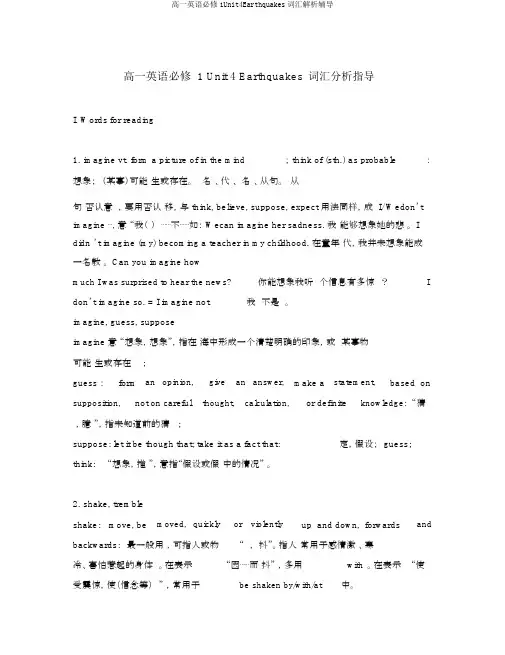
高一英语必修 1 Unit 4 Earthquakes词汇分析指导I. Words for reading1. imagine vt. form a picture of in the mind;think of (sth.) as probable:想象;(某事)可能生或存在。
名、代、名、从句。
从句否认意,要用否认移,与 think, believe, suppose, expect 用法同样,成 I/ Wedon’t imagine ⋯, 意“我()⋯⋯不⋯⋯如: Wecan imagine her sadness. 我能够想象她的悲。
I didn ’t imagine (my) becoming a teacher in my childhood. 在童年代,我并未想象能成一名教。
Can you imagine howmuch I was surprised to hear the news?你能想象我听个信息有多惊?I don’t imagine so. = I imagine not.我不是。
imagine, guess, supposeimagine 意“想象,想象”,指在海中形成一个清楚明确的印象,或某事物可能生或存在;guess :form an opinion,give an answer,make a statement,based on supposition,not on careful thought,calculation,or definite knowledge:“猜,臆”,指未知道前的猜 ;suppose: let it be though that; take it as a fact that:定,假设;guess; think:“想象,推”,意指“假设或假中的情况” 。
2. shake, trembleshake: move, be moved,quickly or violently up and down, forwards and backwards:最一般用,可指人或物“ ,抖”。
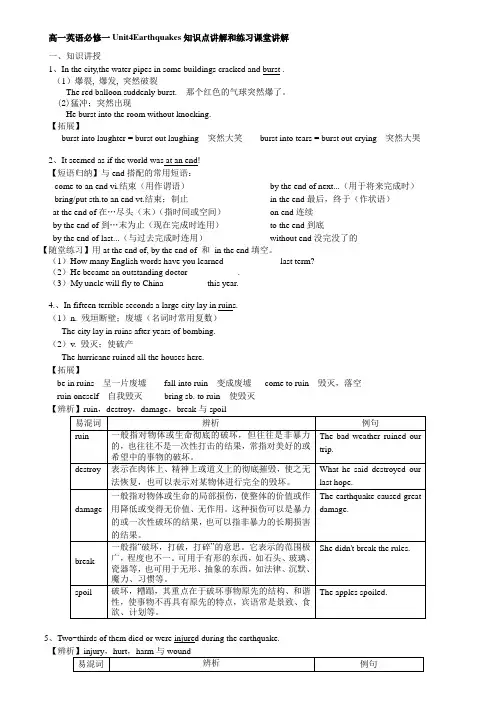
高一英语必修一Unit4Earthquakes 知识点讲解和练习课堂讲解一、知识讲授1、In the city,the water pipes in some buildings cracked and burst .(1)爆裂, 爆发, 突然破裂The red balloon suddenly burst. 那个红色的气球突然爆了。
(2)猛冲;突然出现He burst into the room without knocking.【拓展】burst into laughter = burst out laughing 突然大笑 burst into tears = burst out crying 突然大哭2、It seemed as if the world was at an end!【短语归纳】与end 搭配的常用短语:come to an end vi.结束(用作谓语) bring/put sth.to an end vt.结束;制止 at the end of 在…尽头(末)(指时间或空间) by the end of 到…末为止(现在完成时连用) by the end of last...(与过去完成时连用) by the end of next...(用于将来完成时)in the end 最后,终于(作状语)on end 连续to the end 到底without end 没完没了的【随堂练习】用at the end of, by the end of 和 in the end 填空。
(1)How many English words have you learned ____________ last term?(2)He became an outstanding doctor ___________.(3)My uncle will fly to China _________ this year.4.、In fifteen terrible seconds a large city lay in ruins.(1)n. 残垣断壁;废墟(名词时常用复数)The city lay in ruins after years of bombing.(2)v. 毁灭;使破产The hurricane ruined all the houses here.【拓展】be in ruins 呈一片废墟 fall into ruin 变成废墟 come to ruin 毁灭,落空ruin oneself 自我毁灭 bring sb. to ruin 使毁灭5、Two -thirds of them died or were injured during the earthquake.【辨析】injury ,hurt ,harm 与wound6、Some of the rescue workers and doctors were trapped under the ruins.(1) n.援救,营救The police came to his rescue and pulled him out of the river.(2)v. 救援;拯救He rescued a boy from drowning.【拓展】rescue sb./ sth. from sb./ sp. 把···从···营救出来come to/ go to sb’s rescue = rescue sb. 援救某人 a rescue team 救援队a rescue mission 救援任务rescue workers 救援人员【随堂练习】用rescue的适当形式填空(1)The mother, along with her two children, _________from the sinking boat by a passing ship.(2)The firemen ________ five children from the burning house yesterday.7、…that hot water give out .(1)分发;发出Students were giving out leaflets to everyone in the street.The red radiator gives out a lot of heat.(2)用尽My money will give out soon.【归纳总结】give out分发;发出;用尽give sth.away赠送;颁发;泄露give back归还;恢复give in呈上;投降,屈服,认输give off发出,放出give over停止,中止give up放弃give on to/onto sth.朝向,面向;通向8、Your speech was heard by a group of five jueges,all of whom agreed that it was the best one this year.(1) n.裁判员;法官;审判员His father used to be a judge. 他的父亲过去是一名法官。
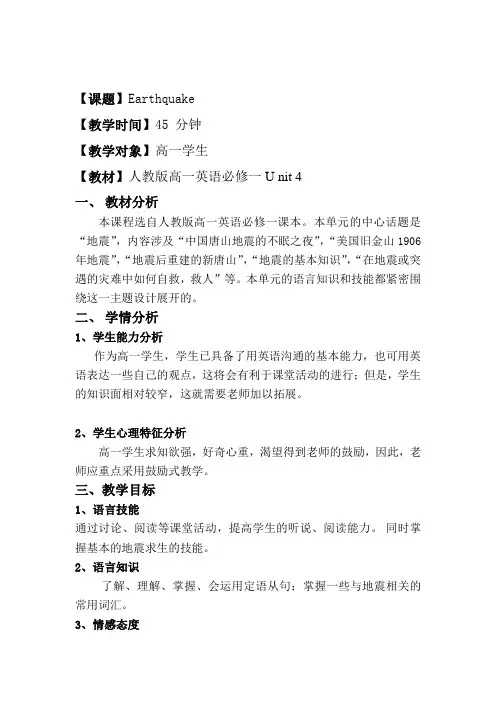
【课题】Earthquake【教学时间】45 分钟【教学对象】高一学生【教材】人教版高一英语必修一U nit 4一、教材分析本课程选自人教版高一英语必修一课本。
本单元的中心话题是“地震”,内容涉及“中国唐山地震的不眠之夜”,“美国旧金山1906年地震”,“地震后重建的新唐山”,“地震的基本知识”,“在地震或突遇的灾难中如何自救,救人”等。
本单元的语言知识和技能都紧密围绕这一主题设计展开的。
二、学情分析1、学生能力分析作为高一学生,学生已具备了用英语沟通的基本能力,也可用英语表达一些自己的观点,这将会有利于课堂活动的进行;但是,学生的知识面相对较窄,这就需要老师加以拓展。
2、学生心理特征分析高一学生求知欲强,好奇心重,渴望得到老师的鼓励,因此,老师应重点采用鼓励式教学。
三、教学目标1、语言技能通过讨论、阅读等课堂活动,提高学生的听说、阅读能力。
同时掌握基本的地震求生的技能。
2、语言知识了解、理解、掌握、会运用定语从句;掌握一些与地震相关的常用词汇。
3、情感态度以“Earthquake”为主题,使学生开阔思维,养成积极思考、独立思考的好习惯,同时培养学生的团队合作精神,热爱生命和生活的人生观。
4、学习策略学会快速阅读的技巧。
通过课堂语言实践活动,培养学生英语交际能力,思维力、想象力。
5、文化知识了解国内和国外的一些灾难史。
四、教学重难点重点:1 、掌握基本的地震自救和求生知识2、掌握定语从句3、掌握快速阅读的技巧难点:1 、如何在规定的时间内更好的启发学生。
2 、使学生掌握快速阅读的技巧五、教学方法(1)情景教学法通过让学生们创设自己处在地震的环境下,会通过什么方式来自救求生。
(2)课堂讨论法在教师指导下,学生运用已学知识,围绕“国内外还有哪些比较有名的灾难“和你对唐山的大地震了解多少”等话题展开讨论。
(3)读书指导法教师通过设置针对性较强的问题,引导学生阅读课文,找出答案。
六、教学用具教学器具:卡纸演示器材:多媒体课件、图片(一些自然灾害和地震的图片)、黑板七、教学流程图八、教学主要环节Step 1 视频与图片导入,引出话题(4min )Step 2 引导学生在地震时如何自救(10min )Step 3 教授定语从句(以that which who he whose 为引导)(15min )Step 4 引导学生进入课文学习 (6min) Step 5 引导学生带着问题进行快速阅读(7min)Step 6 总结与作业布置(3min )九、教学过程These are the trees which were plantedlast year.2 、学生了解这个结构后,我将让学生翻译以下句子正在那阅读的男孩是汤姆。
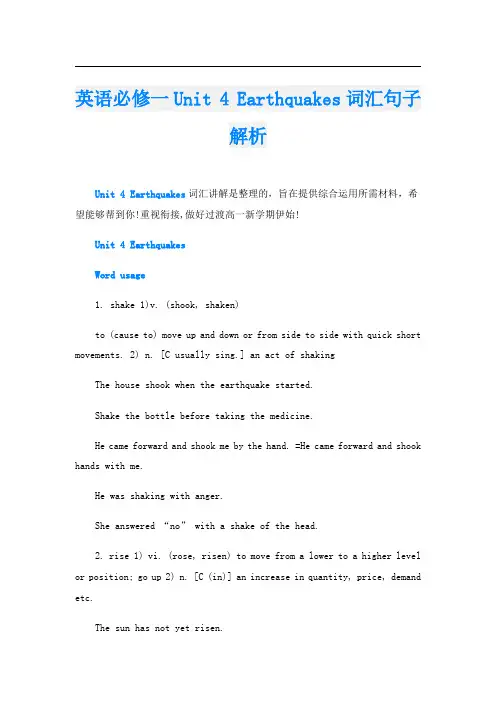
英语必修一Unit 4 Earthquakes词汇句子解析Unit 4 Earthquakes词汇讲解是整理的,旨在提供综合运用所需材料,希望能够帮到你!重视衔接,做好过渡高一新学期伊始!Unit 4 EarthquakesWord usage1. shake 1)v. (shook, shaken)to (cause to) move up and down or from side to side with quick short movements. 2) n. [C usually sing.] an act of shakingThe house shook when the earthquake started.Shake the bottle before taking the medicine.He came forward and shook me by the hand. =He came forward and shook hands with me.He was shaking with anger.She answered “no” with a shake of the head.2. rise 1) vi. (rose, risen) to move from a lower to a higher level or position; go up 2) n. [C (in)] an increase in quantity, price, demand etc.The sun has not yet risen.The population of the city has risen to five million.He rose and left the room.There will be a rise in unemployment next year.Theres been a sharp rise in the cost of living.2. pond n. an area of still water smaller than a lake, especially one that has been artificially madeSome cattle were drinking at the pond.There are some fish living in the pond.When an earthquake is coming, fish will jump out of ponds.3. burst 1) v. to (cause to ) break open or break apart suddenly and violently, usually as a result of pressure from within and often cause the contents to become widely scattered.2) n. an act of result of bursting; (of) a sudden short period of great activity, loud noise, strong feeling; outbreakThe balloon burst.After ten days of rain the river burst its banks.A burst of hand-clapping followed the ending of the song.4. canal n. an artificial stretch of water dug in the ground to allow ships or boats to travel alongit, or to bring water to or remove water from an areaCoal used to be sent here by canal.Canals have been built to irrigate the desert.The Panama Canal joins two oceans.5. steam n. [U] 1) water in the state gas produced by boiling2) power or effort produced by steam under pressure, and used for making things work or moveWho invented the steam engine?Steam was used to be the power of a train.There is steam bursting from that hole.6. ruin 1. n. a) [U] the cause or state of destruction and decayb) [C] a building that has been badly damaged or destroyed2. vt. a) to spoil or completely destroy a person or thingb) to cause someone to loss all their moneyThe temple has fallen into ruin.We visited the ruins of the temple.The heavy rain ruined our holiday.The hurricane ruined all the houses here.The flood ruined the crops.If I lose my lawsuit(官司), the cost will ruin me.7. injure vt. to cause physical harm to (a person or animal), especially in an accident; hurt seriously; to damageI hope I didnt injure her feelings.His back was injured.Two people were killed and seven were injured.His reputation will be badly injured by the vicious rumour.8. destroy vt. to damage sth so severely that it can not be repaired; put an end to the existence of; ruinA fire destroyed the house.What he said destroyed our last hope.All hopes of peaceful settlement were destroyed by his speech.9. brick n. [C,U] 1) a hard piece of baked clay used for building2) sth. in the shape of a brickThey used yellow bricks to build the house.The tower is made of bricks.Bricks covered the ground like red autumn leaves.10. useless adj. not of any useThis knife is so blunt. Its useless.I realized it was useless to reason with him.I was useless at maths. = My maths is very poor.11. shock 1) n. a) [C, U] a violent force from sth such as explosion,a crash or a hard blowb) [C, U] the feeling you get after sth unexpected and usually very unpleasant has suddenly happened, or you have received an unexpected piece of newsc) the poor medical condition of someone who has an accident and whose heart and lungs are not working properly2) v. to make someone feel very upset, angry, or unpleasantEarthquake shocks are often felt in Japan.The news of his death was a shock to us.The traffic accident sent him into a state of shock.They were shocked by her rudeness.We were shocked by his sudden death.12. rescue v. to save someone or sth from harm or dangerHe rescued three children from the burning building.The life boat was sent out to rescue the sailors from the sinking ship.The boy was rescued after hours at sea.13. disaster n. [C,U] a sudden event causes great loss or harmWe were all shocked by the disaster.The earthquake is one of the worst natural disasters the country has ever suffered. People began to wonder how long the disaster would last.14. organize v. to plan and arrange an event; to arrange things ina sensible orderWell organize an oral English contest.The story is very well organized.They organized the truckers into a union.15. shelter 1) n. a) [U] protection, especially from bad weather or danger b) a building that protects you from weather or danger.2) vt. to protect someone or sth from bad weather or danger;vi. to stay in a place in order to be protected from bad weather or dangerThe umbrella is a poor shelter from heavy rain.Their immediate need is for food, clothing and shelter.The wall sheltered us from the wind.She was accused of sheltering a murderer.She wad sheltered by the USA.In the rain people were sheltering in the doorways of shops.16. fresh adj. 1) new and different (only before a noun ); 2) recently picked, caught, produced and therefore in good condition (used of food);3) clean, cool and pleasantThey buy fresh meat.This kind of fish lives in fresh water.She is fresh from university.She is quite fresh to office work.17. percent n. parts for each 100The bank has increased its interest rate by one percent.Over ninety percent of the islanders here are illiterate.He spends a large percent of his income on food and drink.18. speech n. 1) [C] a formal talk to a group of listeners2) [U] the ability to speak or the act of speaking3) [U] way of speakingThe chairman made an opening speech.She is researching speech development in children.We express our thoughts by speech.By your speech I can tell youre from Hong Kong.19. judge 1) vi. vt. to decide who or what is the winner in a competition2) [vt. + that] to form or give an opinion about someone or sth after careful thoughtjudging from, judging by…3) n. a public official who has the power to decide questions brought before a court of law; a person who has the knowledge and experience to give an opinion about the value of sthYou cant judge a book by its cover.He is going to judge the first race.We must judge whether he is guilty.The prisoner was taken before the judge.He was one of the judges at the horse race.20. honour 1) n. a) [U] great respect and admirationb) [sing] sth that brings great respect and pride2) v. to show respect to sb. or to praise sb. publiclyWe fight for the honor of our country.He is an honor to our school.Children should be taught to show honor to their elders.He honors his teachers.20. prepare 1) vt. to make sth. ready for a future event or action 2) vi. to get ready to do sth.They prepared themselves for the worst.When we arrived home, mother had already prepared dinner for us.I was preparing for bed when I heard a knock at the door.Useful expressions1. right awayat once ; in no time; immediatelyI will return the book right away.I am getting in touch with him right away.We are about to start right away.2. end1) at an endfinish; overIt seems that the world was at en end.2) bring… to an end =put an end to…I wonder how I can bring the dispute to an end.=I wonder how I can put an end to the dispute.3) come to an endThe meeting came to an end at midnight.4) at the end of…At the end of the road there is a shop.5) by the end of…How many English words have you learned by the end of last term?6) in the end =at last; finallyHe will be a scientist in the end.3. dig out1) to get sth out of a place, using a spade or your hands2) to find sth you have not seen for a long time, or that is not easy to findLets dig out the roots.Why did you dig out all those old magazines?We must dig the truth out of him.1. a (good \ great \ large) number of+ n.(pl.)many; a large quantity of; a lot ofA good number of students are not interested in modern art.Ive seen the film a number of times.The Great Wall attracts a great number of foreign tourists every day.the number of…The number of private colleges has increased.= Private colleges have increased in number.5.give out1) to give sth to a number of different people, especially to give information to people2) to produce light, heat, a sound, a gas, smell etcYou have no right to give my telephone number out.Students were giving out leaflets(传单)to everyone on the street.The teacher gave out the examination papers.The radiator (散热器) is giving out a lot of heat.与give有关的常用短语还有:give away 送掉,捐赠give in 让步,屈服give off 发出(气味、光、热、声音等),此时相当于give outgive up放弃give back 归还6.thousands of基数词+s,并不表示确切的具体数字,可以单独使用,也可以先接介词of 再接复数名词。
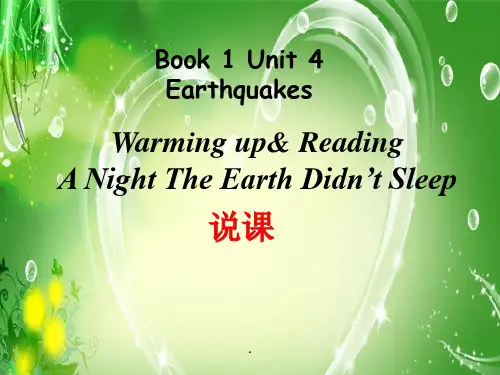
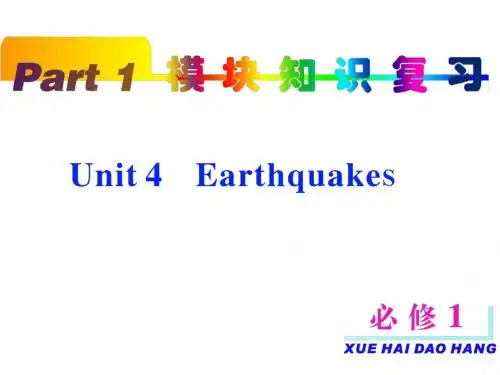
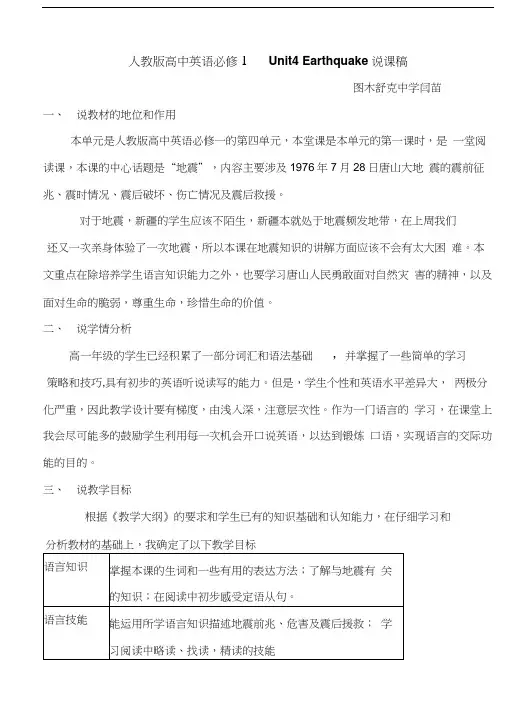
人教版高中英语必修1 Unit4 Earthquake说课稿图木舒克中学闫苗一、说教材的地位和作用本单元是人教版高中英语必修一的第四单元,本堂课是本单元的第一课时,是一堂阅读课,本课的中心话题是“地震”,内容主要涉及1976年7月28日唐山大地震的震前征兆、震时情况、震后破坏、伤亡情况及震后救援。
对于地震,新疆的学生应该不陌生,新疆本就处于地震频发地带,在上周我们还又一次亲身体验了一次地震,所以本课在地震知识的讲解方面应该不会有太大困难。
本文重点在除培养学生语言知识能力之外,也要学习唐山人民勇敢面对自然灾害的精神,以及面对生命的脆弱,尊重生命,珍惜生命的价值。
二、说学情分析高一年级的学生已经积累了一部分词汇和语法基础,并掌握了一些简单的学习策略和技巧,具有初步的英语听说读写的能力。
但是,学生个性和英语水平差异大,两极分化严重,因此教学设计要有梯度,由浅入深,注意层次性。
作为一门语言的学习,在课堂上我会尽可能多的鼓励学生利用每一次机会开口说英语,以达到锻炼口语,实现语言的交际功能的目的。
三、说教学目标根据《教学大纲》的要求和学生已有的知识基础和认知能力,在仔细学习和分析教材的基础上,我确定了以下教学目标四.说教学重点和难点1•重点:依据《英语课程标准》话题项目表关于自然灾害部分的话题要求(P76), 了解、理解该自然灾害的情况,以达到能够交流、阅读、书面表达该类文章的能力。
2•难点:地震相关词汇的积累,细节阅读后达到复述的目标。
五.说教学方法根据学生特点,以期激发学生的学习兴趣,在过程中学会参与,在参与中学会学习。
因此选定采用以下教学方法:1、任务型教学,如:阅读后完成目标练习taskl、task22、小组合作学习,如:team work部分3、头脑风暴法,如:Retell the story部分六.说教学过程Step 1: Lead-in 导入(2')First, I will show stude nts several pictures, to review some words for n atural disasters. 设计意图:用温故知新的方式导入本课的话题,达到知识循环滚动运用的目的。
人教版高一Unit4Earthquakes说课稿Unit 4 Earthquakes说课稿各位老师:大家好!我是XX号考生顾雨,来自河南财经政法大学成功学院。
我今天所说的课题是高中一年级英语上册第4单元Earthquakes。
我说课的内容包括五部分,1.教材内容分析今天我说课的内容是高一英语必修1第4单元Earthquakes,内容主要涉及“中国唐山地震的不眠之夜”“地震后重建的新唐山”“地震的基本知识”“地震中如何自救,救人”,通过本单元学习,掌握如何表达过去的事情,让学生对地震有更多认识,加强自我保护。
2、教学目标分析新课标提出了立体三维教学目标,本课我设计的教学目标如下:1)知识目标:熟悉本课的一些新单词,短语和句型。
语法方面掌握以which,that,who,whose引导的定语从句。
并学会先拟定提纲在写新闻报道的方法。
2)能力目标:训练学生的阅读技巧(略读、寻读等),形成用英语获取信息、处理分析信息的能力。
并鼓励学生开口说英语。
3)情感态度目标:①通过学习激发学生对英语学习的浓厚兴趣;②使学生在领会语言丰富多彩性的同时对地震有更多认识,加强自我保护。
学会在地震中如何自救和救人。
③通过对课文学习的小组讨论等形式,帮助学生养成团结、协作的品质。
3、教学重点、难点:1)教学重点:①让学生熟悉与本话题相关的一些重点单词、短语。
②提高学生的阅读能力,掌握多种阅读方法,如寻读,精读,理解等。
2)教学难点:对阅读中所获取的信息进行加工学习,形成有效的学习策略。
鼓励学生开口说英语。
高一年级的学生已经在初中阶段的英语学习中,已经积累了一定的词汇基础,并掌握了一些简单的学习策略和技巧,具有初步的英语听说读写能力。
但学生的英语水平参差不齐,教学既要进一步培养尖子的学习能力又要保证能力稍弱的学生能听懂,调动他们的积极性,使他们愿意学,在学习的过程中享受到乐趣。
虽然对英语有一定的兴趣但其学习主动性仍有待提高,未能积极主动地通过其他渠道获取信息,自主学习、探究学习的能力还有待于提高。
Lesson Plan InterpretationTeaching material: NSEFC Book 1 Unit 4 EarthquakeHello! Ladies and gentlemen. Today my topic is Unit 4 reading. Now allow me to introduce the first part:Ⅰ. Analysis of the teaching materials:1.The importance of this lessonThis lesson is a reading passage. It plays a very important role in English teaching of this unit because we should lay particular emphasis on the students’ reading ability in senior English teaching.2.What to teach -teaching contents1.)get some basis knowledge about Tangshan earthquake2.)get the students to comprehend the passage better3.)do some listening, speaking and writing4.)moral educationIn this passage we should help the students get some knowledge about the Tangshan earthquake. At the same time we ought to get the student to comprehend the passage better. The students should do some listening, speaking and writing, too. Of course, the students should receive some moral education.3.The important and difficult points in this lesson:Important points:1.)some knowledge about earthquakes2.)to improve the students reading abilityDifficult points:using the learned phrases and sentence patterns to express one’s ideasⅡ. Teaching aims:My teaching aims includes 3 parts: knowledge aim, ability aims and moral education aims1.Knowledge aim: by the end of the lesson, students will have a better understanding of themeaning and structure of the text.2.Ability aims:1.)use what we have learned to describe what would happen before – during – after theearthquake2.)improve the re ading skill and use English to express one’s ideas3.Moral education aims: learn the bravery of facing the natural calamity from people inTangshan and we should always hold an optimistic attitudeⅢ. Analysis of the teaching theories and methods:That’s all for my teaching aims. Now let’s focus on the third part, Analysis of the teaching theories and methods. When I deal with this lesson. I’ll do my best to carry out some teaching theories of the new curriculum: taking the students as the host and the teacher subordinate .Carry out task-based learning and cooperative learning. Let the students receive some moral education while they are learning the English language.1.Teaching theories: The new curri culum (“taking the students as the host and the teachersubordinate”, “Cooperative learning”, “Take-based learning”, “Communicative learning”)2.Teaching methods: “Communicative Language Teaching”, “Take-based Activity”3.Learning methods: “Discovering learning”, “Cooperative learning4.Teaching aids: A tape recorder, the blackboard and PPTSince it is a reading passage, it is very important to develop the students’ reading ability. I’ll use some reading methods such as preparation for reading, (lead-in) scanning, skimming and intensive reading (in-depth reading or study reading). In class, I’ll try to use encouraging and polite remarks such as “Do you want a go?” “volunteers” “Well done!” “You did a good job!” “Thanks!” and so on. I’ll get the students to have a competition to develop their quick response. I’ll make full use of modern equipment such as the multi-media and tape recorder to make the class more lively and interesting.Ⅳ. Analysis of the students:The students are in Grade 1. They are still at an age that would like to have competition with others. They have known something about the earthquakes. Some long sentences are difficult for them to understand. So I will help the students in different levels to learn English.Ⅴ. Analysis of the teaching process: Now came to the most important partStep1. Lead-in:1.)show some pictures of Tangshan (before the earthquake)2.)let the students to imagine what would happen after the earthquake (ask some studentsto speak out their ideas)My purpose here is to let the Ss know what we are going to look atStep2. While reading: in this step I will let the students read the text twice1.fast reading: scanning & skimming1.)first tell the students this passage can be divided into three parts and tell them the clueof the story : time order (tell them to pay attention to the first sentences of each para.)2.)read silently to get the structure (after several mins I will discuss the structure with thestudents)Part 1 (para 1) Strange things were happening before the earthquake, bot no one took any notice of themPart 2 (para 2-3) The earthquake destroyed the city of Tangshan and shocked the people very muchPart 3 (para 4) The army came to help the survivors, bringing hope for a new life2.careful reading: intensive readingdo the exer cise in students’ book in P27 1,2 (a competition: divide the Ss into four group, and then the one who stand up fast and give the right answer can get ten marks for his group, the group which gets the highest mark will get a present)Step3. Consolidation:1.listen to the tape and read the passage aloud (Play the tape of the passage for thestudents to listen and then ask them to read it aloud. Tell them to pay attention to thepronunciation, stress and intonation while listening. At the same time they can enjoythe beauty of the English language. And it can prepare the students for the retelling innext step.)2.fill in the blank with proper words3.retell the story in your wordsSince the students in the class are in different levels, so first I will let them to fill in the blank to get an expression of the general idea of the textStep4. Post reading -discussion1. a short video about the 5·12 Wenchuan earthquake2.pictures of Tangshan and Wenchuan (on the screen)3.discuss: What can we do for the rebuilding of Wenchuan and how can we protectourselves if an earthquake happens?4.volunteersoptional: show them some pictures of Wenchuan people and tell the Ss: Where there is a life, there is hopeStep5. Homework1.read the text again after class and figure out the meaning of the following complexsentences (so these in class if time allow)2.write a short paragraph to describe what had happened before – during – after theearthquake using your own words3.surf the Internet to learn more about how to protect yourself and people if anearthquake happenⅥ. Contents on the blackboardUnit 4 EarthquakeA Night the Eart h didn’t SleepStructure of the whole passage:Clue of the story: Time orderBefore – during – after the earthquakePart 1 (para 1) Strange things were happening before the earthquake, but no one took any notice of themPart 2 (para 2-3) The earthquake destroyed the city of Tangshan and shocked the people very muchPart 3 (para 4) The army came to help the survivors, bringing hope for a new lifeHomework for today:Ⅶ. My teaching dailyIn this lesson, I lead the students understand the passage step by step, and help them to retell the story and hold a discussion. But there are some new language points in the passage, so I willexplain them for the students next period.Ok, that’s all for my interpretation. For the time is limite d, there must be some mistakes in my interpretation; I hope you can give me some suggestions.。
高一英语说课稿范文必修1 Unit4 Earthquakes 说课稿一、说课标在英语教学中落实新课程标准,就是贯彻执行国家教育部关于课程改革的决定。
新课程标准的三维教学观,具体到英语学科就是要整合发展学生语言技能、语言知识、情感态度、学习策略和文化意识五个方面的素养,培养学生综合运用语言的能力。
《基础教育课程改革纲要》中明确指出:“教师在教学才过程中应与学生积极互动、共同发展,要处理好传授知识与培养能力的关系,注重培养学生的独立性和自主性,引导学生质疑、调查、探究,在实践中学习,促进学生在教师指导下主动地、富有个性地学习。
教师应尊重学生的人格,关注个体差异,满足不同学生的学习需要,创设能引导学生主动参与的教育环境,激发学生的学习积极性,培养学生掌握和运用知识的态度和能力,使每个学生都能得到充分的发展。
因此,本课的设计重点是:帮助学生形成自主、合作、探究的学习模式,掌握阅读的一些基本技巧,让每个学生在原有的基础上都学有所得。
二、说教材(一)教材地位和教学内容分析本课是高一必修模块1第4单元的阅读课型,这单元围绕earthquakes这一主题开展听、说、读、写多种教学活动。
由于本单元生词量较大,并且Warming up可挖掘的东西较多,因此把Reading设计为本单元的第2课时。
本课型是单元整体教学的重要环节,为学生的语言学习、语法学习提供了载体,并且是学生获取信息的主要来源。
“Reading―――A NIGHT THE EARTH DIDN’T SLEEP”具体描写1976年唐山大地震的震前、震中和震后。
本篇文章词汇量大,运用了大量的动词、复杂的数字,出现许多定语从句,篇幅较长,并且采用一些修辞手法,对学生的语言阅读能力提出了更高的要求。
但文章的结构较明显,较容易归纳出各部分的中心词。
(二)教学目标根据新颁布的《普通高中英语课程标准(实验稿)》关于阅读课主要教学目标的具体描述,结合本课教学内容,具体从语言知识、语言技能、情感态度和文化意识三个方面制定如下教学目标。
人教版高中英语必修1Unit4 Earthquake 说课稿一、教材的地位和作用本单元的中心话题是“地震” 。
本课的内容主要涉及了1976 唐山大地震的震前预兆、地震发生时的情况、震后的破坏和伤亡情况以及震后的救援工作。
对于地震,学生应该不陌生,有相应的知识构架,特别是在汶川和玉树地震后,人们对地震还心存余悸,所以本课在自然知识的讲解方面应该不会有太大困难。
本文重点在于培养学生语言知识能力之外,也要鼓励学生遇到困难时勇于面对,树立“一方有难,八方支援” 的社会责任感。
二.学情分析高中一年级的学生已经在初中阶段的英语学中,已经积累了一定的词汇基础,并掌握了一些简单的学习策略和技巧,具有初步的英语听说读写能力。
但是,学生个性和英语水平差异大,因此教学设计要有梯度,由浅入深,注意层次性。
英语作为一门语言,其最基本的作用就是人际交流。
但是中国学生普遍的情况是不愿开口说英语。
因此我在课堂要鼓励学生们利用每个机会开口说英语,以达到锻炼口语的目的。
三、教学目标根据《教学大纲》的要求和学生已有的知识基础和认知能力,在仔细学习和分析教材的基础上,我确定了以下教学目标。
语言知识语言技能掌握本课的生词和一些有用的表达方法以及定语从句用法;了解与地震有关的知识。
根据已知信息推测将要学习的材料;(推测)能运用所学语言知识描述地震前兆、危害及震后援救;(说)学习阅读中略读和找读,和细读的技能(读)学习唐山人民勇敢面对自然灾害的精神;在教学活动中培养学生的合作精神和互助精神。
了解世界各地的自然灾害和大地震的情况, 了解有关地震的知识,启发学生国际援助意识。
培养学生通过各种渠道如报纸、杂志、图书馆和网络等资源搜集信息的能力。
情感态度文化意识学习策略四.教学重点和难点 1.重点:培养学生在阅读过程中获取和处理信息的能力。
2.难点:学生利用所学知识谈论地震这个话题。
五.教学方法与工具。
根据高中生的心理特点,宜采用形式多样的教学方法和学生积极主动参与的学习方式,激发学生的学习兴趣,让他们在学习中学会参与,在参与中学会学习。
Unit 4 Earthquakes【重点词汇】1 ruinn.毁灭;毁坏;崩溃;(不可数名词)废墟;遗迹(常用复数vt.&vi.(使)毁坏;毁灭;成为废墟;使破产①The castle has fallen into rain.那城堡已破败不堪。
②An earthquake left the whole town in ruins.那次地震过后,全城到处是残垣断壁。
‘③It poured with rain and my dress got/was mined.大雨倾盆,我的连衣裙已淋得不成样子了。
归纳拓展fall into ruin崩塌come/go to ruin毁灭,崩溃lie in ruins成为废墟the ruins of Yuanmingyuan圆明园遗迹bring sb.to ruin使某人破产ruin one’s hopes使某人希望破灭ruin oneself自取灭亡ruin one’s health/fame毁坏某人的健康/名誉辨析活用damage/destroy/ruin/spoil这三个词都有“损坏,破坏”之意,具体区别如下:(1)ruin指彻底摧毁一件事物,特别是摧毁美好、珍贵的事物,并使其无法修复,其主语多为天灾人祸等无形的力量。
有时可用于借喻中,泛指一般的“弄坏了”。
He has ruined his health through drinking.他饮酒过度,把身体搞坏了。
(2)damage指“损坏”,表示不彻底的破坏,一般是部分性的,只是使其不能发挥正常作用,意味损坏后价值或效率降低,宾语一般是物。
I damaged my shoes in football practice today.今天练习踢足球时我把鞋弄坏了。
(3)destroy指十分彻底的“破坏”,常含有不能或很难修复的意思,也可以用作比喻意义,指希望、梦想等的破灭;主语可以是人,也可以是物;后接人或物都可以。